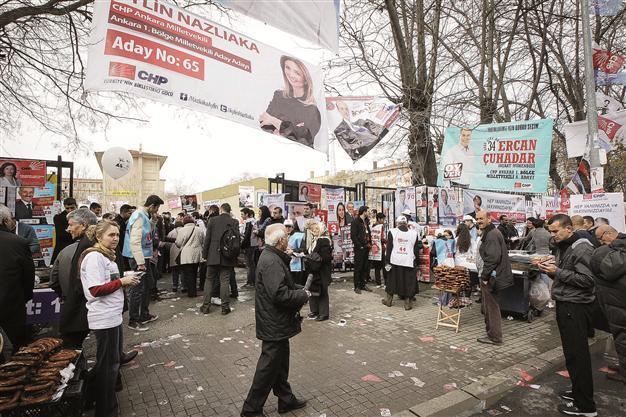Analysis: Members of Turkey's main opposition CHP deliver message of change in primaries
Özgür Korkmaz

AA Photo
The hopes of the main opposition Republican People’s Party’s (CHP) old guards that they would make a glorious comeback were disappointed over the weekend after party members selected fresh faces in the weekend’s primary elections.
Hundreds of thousands of CHP members flocked to polling stations on March 29 to vote for their elected candidates ahead of the June 7 parliamentary elections, making the CHP the sole party to conduct primaries.
While the results were disappointing for names who once held power within the party, new names will make up the majority of the CHP’s electoral lists in the upcoming election.
Former CHP leader Deniz Baykal came second in the primary of his hometown Antalya, finishing behind Nefi Kaya, a popular doctor. A former close aide to Baykal and the party’s former secretary general, Önder Sav, who kept Baykal at the helm until the party leader resigned from the post in 2010 (he was dubbed the kingmaker for paving the way for Kemal Kılıçdaroğlu to replace Baykal) failed to get enough votes for a place in the candidate list for June 7.
Mustafa Sarıgül, the former Şişli mayor who returned to the CHP last year to run for the Istanbul Metropolitan mayor’s post, finished fifth in the primary for Istanbul’s second electoral district, putting his chances of being elected to parliament at risk.
According to the CHP’s earlier announced system, candidates who ran in the primaries would be put in the second, fourth, sixth and eighth spots in the electoral districts of Istanbul, Ankara and İzmir, while the remaining top spots are reserved as part of quotas.
Female candidates will run in the first spot in Istanbul’s three electoral districts, as well as two electoral districts in both Ankara and İzmir.
Another former kingmaker, former secretary general Adnan Keskin, was one of the biggest losers of the primaries after failing to get a spot on the seven-candidate electoral list in his hometown of Denizli, let alone a spot to be elected to parliament.
In many provinces, the winners were popular locals who had been mostly left out of former electoral lists due to the quota preferences of the party administration.
Kılıçdaroğlu, who himself ran in the second electoral district of İzmir and topped the election, receiving over 85 percent of the votes cast, praised the choices made by the CHP members.
“The CHP has taken a very important step,” he told reporters in Ankara. “As the party leader, I advised the members to care for the youth and the women, and the lists have mostly been shaped in this regard. Politics needs new people, if we could manage this, the other parties should follow and hold primary elections.”
Although the picture in the CHP primaries for the youth and the women is not as bright as Kılıçdaroğlu painted, female candidates especially did well in some constituencies.
In Istanbul, Gamze Akkuş İlgezdi, wife of Ataşehir Mayor Battal İlgezdi, came in second in the first electoral district, while Gülay Yedekçi Aslan and Didem Engin were in the top five in the second electoral district. Emine Gülizar Emecan is expected to be elected to parliament in the third electoral district.
In Ankara, where there was a high turnout despite heavy rain, current lawmaker Aylin Nazlıaka surprisingly finished second in the primary in the first electoral district, but women failed to secure good spots in the electoral list in İzmir.
Female candidates were more welcome outside the three biggest cities. In Bursa, where the CHP won six parliamentary seats in the 2011 elections, economy professor Lale Karabayık came in second while 37-year-old lawyer Nurhayat Altaca Kayışoğlu finished fifth.
Five of the current six lawmakers of Bursa did not run in the primaries, while İlhan Demiröz was not even in the top 10, according to the results.
In Denizli, the first and the third spots went to female candidates, Melike Basmacı and Gülizar Biçer Karaca, respectively. The CHP won two of the seven seats in the province in 2011.
In Adana, Elif Doğan Tüğrkmen and Müzeyyen Şavkin were in the top five. The party won four seats in the last general election in the province.
In the Central Anatolian province of Yozgat, three of the candidates on the four-person list are women, but the CHP failed to win a single seat in the province in 2011.
The CHP currently has 17 female lawmakers, and with the use of party quotas for more female candidates, the party is expected to have more in parliament after June 7.
Most of the names that secured viable spot in the primaries for a seat in the parliament were fresh names, while many current lawmakers running in the primaries failed.
Mahmut Tanal topped the list in Istanbul’s first constituency, and former prosecutor İlhan Cihaner topped the third district. In total, some 25 lawmakers who ran in the primaries are expected to lose their seats in the upcoming election.
The CHP members made it clear in the primaries that they were mostly unhappy with the performances of current cadres and the “very experienced” names within the party. The unwillingness of deputy leaders to run in the primaries has also been a major source of complaint and concern among party members.
Whether the CHP will be able to carry its members’ enthusiasm in the primaries through to the election campaign process depends on whether Kılıçdaroğlu will act in accordance with the message delivered.
